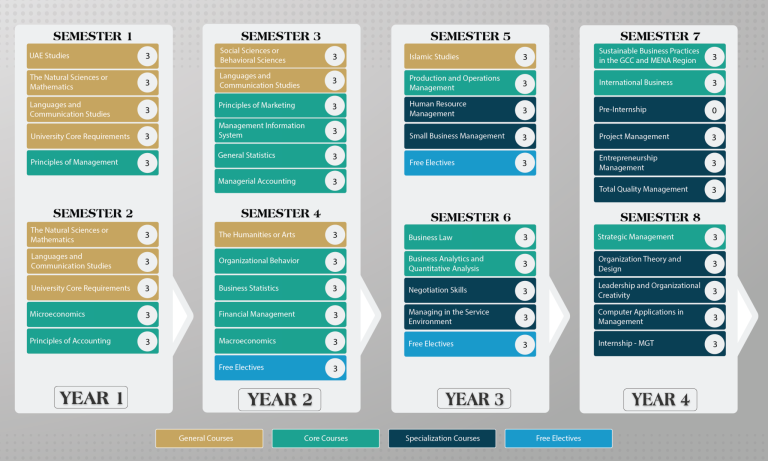
- Overview
- Specialization Structure
- Accreditations
- Faculty
- Admission
-
Duration
4 Years
-
Classes
Weekday Weekend
-
Fees
Tuition (One Semester) ……… Approx. 21,000 AED
One academic year is two semesters
Admission (One Time) ……… 3,150 AED
About Specialization
Develop the skills and acumen needed to lead with confidence in today’s rapidly evolving business landscape. Our Bachelor of Business Administration – Business Management program empowers you to navigate complex organizational challenges, foster innovation and drive growth. From strategic planning and project management to effective team leadership and organizational behavior, this program provides students with a holistic understanding of corporate management roles. Whether you aspire to climb the corporate ladder or start your own unique venture, this program equips you with the knowledge and expertise to turn your ambitions into reality.
Bachelor of Business Administration - Program Goals
- Provide quality and accredited undergraduate business degree programs in the areas of business studies and practices.
- Offer preferred and career-oriented undergraduate business curriculum with specialized coursework and practical application to meet national and international job market demand.
- Prepare students to become professionals in their chosen fields with the skills needed to meet the demands of a dynamic business environment regionally and internationally.
- Develop critical thinking and reasoning skills to evaluate information, solve problems, and make sound decisions.
Bachelor of Business Administration - Program Learning Outcomes
- Acquire knowledge about the fundamental concepts, principles and theories in the specialization.
- Develop interpersonal and leadership skills relevant to their career paths.
- Analyze and interpret specialized data and information to make rational business decisions.
- Apply innovative and advanced approaches to evaluate national and international business environment.
- Demonstrate practical skills of various business disciplines.
Preparatory Courses
Before enrolling in the Bachelor of Business Administration program, students must sit the placement test related to this program. Failure to successfully pass the placement test, the student is required to enroll in the following courses:
#
1
2
3
Course Code
CIT 90
MAT 90
ENG 99
Courses
Computer Preparatory
Mathematics Preparatory
Academic Writing (*)
Credit Hours
0
0
0
Exemption Condition
Passing the Placement Test
Passing the Placement Test
Passing the Placement Test
Program Structure
Course Category
General Education Courses
Core Courses
Specialization Courses
Free Electives
Total
Total Number of Courses
11
18
11
3
43 Courses
Total Number of Credit Hours
33
51
33
9
126 Credit Hours
- General Education Courses
- Core Courses
- Specialization Courses
- Free Electives
A: University Core Requirements
The student selects 6 credit hours (2 courses) from the list below:
B: Languages and Communication Studies
The student must select 9 credit hours (3 courses) from the list below.
Students must take all of the following courses:
Students must take one of the following Arabic Language courses:
C: The Natural sciences or Mathematics
The student must select 6 credit hours (2 courses) from the list below:
D: The Social or Behavioral Sciences
The student must select 3 credit hours (1 course) from the list below:
E: The Humanities or Arts
The student must select 3 credit hours (1 course) from the list below:
F: Islamic Studies
The student must select 3 credit hours (1 course) from the list below
G: UAE Studies
The student must select 3 credit hours (1 course) from the list below.
Organizational behavior studies the influence of individuals, groups, and work culture on behavior within organizations; its chief goal is to improve an organization’s effectiveness. This course introduces students to the core concepts of organizational behavior including attitudes, emotions, and moods; communication; conflict and negotiation; diversity; group behavior and work teams; individual decision making; leadership and power; motivation; organization culture and structure; organizational change; and personality and values.
The course aims to interpret the basic theories and the practices in production and operations management. The course equips the students with the necessary skills, and utilization of tools and techniques for effective and efficient management of operations. It further provides skills to the students for better decision-making and problem solving in any industrial scenario.
This course familiarizes students with the concept of the rule of law as a mechanism for ordering people’s (and companies’) behavior, and for providing predictability and certainty in planning business transactions. Students will consider the legal issues inherent in business, considered from the standpoint of various business roles such as business owner, corporate officer, board member, shareholder, partner, officer, manager, employer and employee, customer and client. It aims to have students anticipate potential legal issues in business transactions so that they can plan to avoid legal problems and, when they do occur, formulate solutions.
This course introduces the core quantitative methods that are prerequisites for adequate business analytics and decision-making in business. It focuses on all three business analytics models, including descriptive, predictive, and prescriptive models. The knowledge taken from this course equips students with tools for assessing various business problems and making decisions based on quantitative business analytics. The overall objective of this course is to provide students with a sound conceptual understanding of management science models and their role in solving business problems.
The course aims to interpret the basic theories and the practices of sustainability in business. It equips the students with insight into how new technologies can be used to solve sustainability issues. The course further creates solutions for effective and efficient management of operations by providing an understanding of how to navigate the tensions between pursuing sustainability initiatives and optimizing business performance.
This course captures the complexity of current business environment and offers contemporary concepts and skills which enables the students to design cutting-edge strategy through skills building exercises. Furthermore, it benefits attendees to gain necessary knowledge to manage consistent higher organizational performance by reading, analyzing and designing suitable working environment. Different models and tools in the course are practically applicable to find out strengths, weakness of the organizations, this analysis finally helps students to design the effective strategies and strategic plan for the business.
Negotiation is an interactive process between two or more parties working together to determine a mutually agreeable solution to an issue of shared interest or mutual dispute. Negotiation plays a vital role in public and private sector organizations for better and smoot functioning. In business, effective negotiation can ensure success, but ineffective negotiation can cripple a company. This course introduces students to best practices and core concepts of negotiation including coalitions; communication; distributive bargaining; ethics, strategy, and planning; integrative negotiation; international and cross- cultural negotiation; difficult negotiations; perception, cognition, and emotion; power and influence; relationships and roles. Students will work individually and in groups on assessments including case studies, discussions, in-class exercises, and presentations to increase their understanding of the curriculum in an academic and practical context.
Organization Theory and Design marks students journey into understanding the mechanisms of organization business processes and the fundamentals of building organizational capabilities. The course enables students to explore the essentials of organization structure and design, its impact on an organization’s internal and external capabilities, organizational culture, power and politics, and the ways in which these are utilized for effective change management and strategic planning. Students are also exposed to the multilayered relationship between these elements and an organization’s ability to navigate the challenges of operating regionally and in a global context.
The course is aimed to provide a wider and much better knowledge of quality concerns in the products and services that are in offering. The course further invites attention of the students in better understanding the importance of quality concerns and best practices to be followed in manufacturing sector. The course provides a better understanding of the international quality standards and its implementation in every industrial sector. The course provides a better understanding of the quality measurement tools and techniques to the students.
Recommended Study Plan

Accreditations
The American University in the Emirates is licensed by the UAE Ministry of Education – Commission for Academic Accreditation | caa.ae

The College of Business Administration and its degree programs (Bachelor of Business Administration, Master of Business Administration, Master of Sport Management) at the American University in the Emirates are accredited by The Association to Advance Collegiate Schools of Business (AACSB) as of 2022. Furthermore, The American University in the Emirates College of Business Administration is a proud member of AACSB.

Prof. Asma Salman
Professor / Dean

Prof. Robert P. Karaszewski
Professor / Program Director - Master of Business Administration

Dr. Sung IL Hong
Assistant Professor / Program Director - Master of Sports Management

Dr. Azzam Hannon
Associate Professor / Department Chair of Accounting and Finance
- For Admission Requirements for Freshman students (those who have just completed high school and have never attended an Institute of Higher Education before) click here
- For Admission Requirements for Transfer students (those who have studied at another higher education institution and would like to transfer their credits to AUE) click here
- For Admission Requirements for Visiting students (those who are currently enrolled in a different higher education institution and would like to take some courses at AUE as part of the study plan of their home university/college) click here
Joining the Program
- Fall Semester
-
September
-
Spring Semester
- January
- Summer Semester
- May















